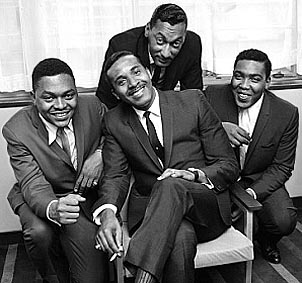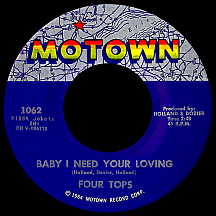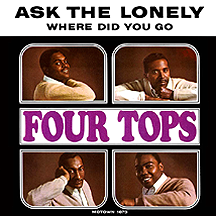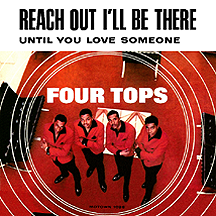FOUR TOPS
Through thick and thin, the friends-for-life who called themselves Four Tops were fiercely loyal to one another. Lawrence Payton, Renaldo Benson (known since childhood as "Obie"), Abdul Fakir (just call him "Duke") and Levi Stubbles (the most famous of the four as Levi Stubbs) could have gone the way of other struggling '50s vocal groups considering the lack of career momentum realized during their first decade. As it turned out, they stayed together 43 years until 1997, when Payton's premature death forced the remaining three to continue for a time as The Tops.
All four were born and raised in Detroit; Payton and Benson attended Northern High School while Stubbs and Fakir were close friends at Pershing High, about five miles away. During this time Levi sang briefly with The 4 Falcons, a group that featured lead singer Jackie Wilson shortly before his star turn with Billy Ward and the Dominoes. Lawrence sang with doowop group The Thrillers, which included future Motown Records songwriter and producer Roquel "Billy" Davis among its ranks; a couple of singles by the group came out locally in 1953. The destined quartet came together as The Four Aims around the time they each graduated from high school in '54 (except for Payton, who was a couple of years younger). One single under this name, "If Only I Had Known," was released on the obscure Grady label. The four friends probably couldn't have guessed that their newly-formed act would remain intact throughout most of their lives.
When people began confusing the name with the extremely successful Ames Brothers, the guys began calling themselves The Four Tops. A break came in the spring of 1955 with Maurice King and his Wolverines' recording of "Baby Say You Love Me" on a short-lived label, Chateau; Carolyn Hayes was the featured singer on the session and the Four Tops supplied backing vocals. Then Billy Davis approached Chess Records head Leonard Chess with a Four Tops demo recording of some of the songs he'd written. Chess liked the songs but wasn't crazy about the group; he offered to release a record by them in exchange for Davis's songwriting services. Hence, "Kiss Me Baby," with a strong lead vocal by Levi, became the Chess label's only single by the Four Tops (a situation that surely would have been different had the record been a promising seller).
Davis continued working with the group, contributing original songs and occasionally providing backing vocals (a fifth Top, if you will) for the next couple of years, but it was a long time before they had another chance to make a record. The Tops toured as backing singers for Billy Eckstine, Brook Benton and others, establishing themselves as an accomplished jazz group specializing in pop material while gradually becoming perhaps too comfortable in the background. Levi's brother, Joe Stubbs, followed his older sibling's example and took a more commercial route, joining The Falcons (a different act than the 4 Falcons) at the age of 16 and singing lead on the group's 1959 hit "You're So Fine." For a time it looked as though little bro Joe would enjoy a level of success in the music business denied Levi; after leaving the Falcons a few years later, Joe made the rounds of other Detroit-based R&B groups including The Contours, The Originals and early '70s funk band 100 Proof Aged in Soul.
The Four Tops kept at it, achieving a level of satisfaction that came with a steady work schedule. At an Eckstine show around 1960, William "Mickey" Stevenson of Berry Gordy's Tamla label noticed the tight and talented quartet, later telling them he felt they had what it took to be headliners and encouraging them to come to the Detroit offices of the recently-established record company. Gordy offered them a contract but they were hesitant about signing with a smaller label and passed, a curious move considering they hadn't made a record in four years.
The mighty Columbia Records came calling in mid-1960 and the Tops jumped on board with an uptempo pop/rhythm song written by Stubbs, "Ain't That Love." Columbia, out of their element for many years when it came to anything approaching rock and roll or R&B, put them on a short leash, canceling the group's contract after the one single (it would have made sense for the company to position them as a pop or jazz act, but for reasons unknown it didn't happen). Resuming a career path in jazz, it was two years before they had another release with a remake of the Arthur Johnston-Johnny Burke standard "Pennies From Heaven," a one-shot for the Riverside label that went by unnoticed as the other efforts had. Meanwhile, Tamla and sister label Motown racked up a stack of hits with a talented roster of young artists. The Four Tops informed Gordy they'd had a change of heart.
Gordy welcomed them as a personal challenge; it was obvious these were polished pros in need of the right material. In 1963 they began work on an album for Gordy's Workshop Jazz label and it came precariously close to being released, but the subsidiary label had performed poorly in just a year of existence. Gordy also questioned the commercial potential of the group as a jazz vocal outfit. The album never materialized (only one of the recorded tracks, "Nice 'n' Easy," found its way onto an album, Four Tops on Broadway, four years later), so the group was earmarked for mainstream Motown stardom. But could they handle the pressure?
The songwriting team of Eddie Holland, Lamont Dozier and Brian Holland achieved the payoff for several months' work with The Supremes by way of the number one smash "Where Did Our Love Go" in the summer of '64. At about the same time, the super-songwriting trio was also responsible for making stars of the Four Tops with a breakthrough hit ten years in the making. The brilliant "Baby I Need Your Loving," while not as commanding a hit as the Supremes' concurrent breakthrough, nevertheless put the group (known from that point on as simply Four Tops) on the map, fittingly symbolized by the Michigan/Lake Erie/Detroit map proudly displayed on the labels of Motown singles and albums. Levi Stubbs wasn't entirely comfortable making the transition from jazz, his real passion, to soul music. In interviews he said he didn't consider himself to be a good singer, making him perhaps the only person unable to identify the obvious. But once the hit streak got going, he settled very comfortably into the role of pop singer, soul singer, any kind of singer.
Holland, Dozier and Holland's "Without the One You Love" disappointed as a follow-up, but the third single, "Ask the Lonely," written by Stevenson and Ivy Jo Hunter, placed the group back in the top 40 in early '65. The next four releases, all H-D-H efforts, established the Tops in the mainstream: "I Can't Help Myself" with its 'Sugar pie, huney bunch' catchphrase, hit number one in June, "It's the Same Old Song" followed it into the top ten a few months later, then "Something About You" and "Shake Me, Wake Me" made top 20 showings (in between, Columbia reissued the five-year-old "Ain't That Love," which made a brief chart appearance). In addition to building an impressive catalog, the quartet sat in as background singers on other Motown artists' sessions; one of the more unusual was when they, and in-house backing group The Andantes, replaced the occasionally-vanishing Vandellas on the 1966 Martha and the Vandellas hit "My Baby Loves Me."

Various Motown staffers took a stab at producing and writing songs for the group, but as with the Supremes, it was the Holland-Dozier team that consistently kept them high on the charts with tight, bright productions that took full advantage of Levi's deeply moving vocal ability. "Reach Out I'll Be There" was an attention-grabber in the summer of 1966 and became the second Four Tops number one smash. "Standing in the Shadows of Love," "Bernadette," "7-Rooms of Gloom" and "You Keep Running Away" ranked among 1967's biggest hits while assuring the Tops' constant presence on radio playlists for the third straight year.
Seeking more control over their material, Holland, Dozier and Holland left Motown in 1967. Lacking a game plan at the beginning of 1968, the label released a couple of tracks from the Reach Out album that were more closely connected to outside artists; against odds, remakes of "Walk Away Renee" (a hit in 1966 for The Left Banke) and "If I Were a Carpenter" (likewise a '66 smash for Bobby Darin) extended the streak of top 20 hits. Two more leftover H-D-H songs, "Yesterday's Dreams" and "I'm in a Different World," unspectacularly filled out the remainder of the year.
It was as if Dozier and the Holland brothers had pulled the rug out from under Levi, Lawrence, Obie and Duke. Other successful writers and producers stepped in with solid material but no major hits; Johnny Bristol tried his hand with "What is a Man." Norman Whitfield and Barrett Strong took their turn with an earlier Gladys Knight and the Pips track, "Don't Let Him Take Your Love From Me." The decade ended with Four Tops in flux.
Frank Wilson produced the foursome on a remake of the chart-topping Tommy Edwards smash from '58, "It's All in the Game," reimagined as a breezy pop-soul number in contrast to the social psychedelia spearheaded by The Temptations and, before long, other Motown acts. In the spring of '70 it became the Tops' first top 40 hit in two years. Another Wilson production, "Still Water (Love)" (cowritten by Wilson and Smokey Robinson), was even bigger that summer. Next they were teamed with the Supremes (as the Tempts had been, with chart-topping results, two years earlier), the notable difference being the absence of Diana Ross, who had gone solo as the new decade dawned. Replacement Jean Terrell traded the vocal lead with Levi on "River Deep - Mountain High" in a bold attempt to succeed where Phil Spector had failed with his ambitious recording of the Jeff Barry-Ellie Greenwich song by Ike and Tina Turner in 1966; amazingly, this so-so remake became a sizeable hit in early '71, a nice distinction for the Supremes and Four Tops but a head-scratcher in all other respects.
With Frank Wilson at the helm the group had a solid, if eclectic, run of mid-sized hits over the next year or so ("Mac Arthur Park (Part II)" illustrated some way-out-of-the-box thinking). During this time, Obie Benson scored an unexpected success apart from the group: "What's Going On," his composing collaboration with Marvin Gaye, went against the grain of the purposely non-relevant, strictly-romantic Four Tops. Gaye's recording became the most talked-about of Motown singles and albums in the '70s, a hit so wide-ranging that it's surprising Benson didn't continue along those lines.
Berry Gordy moved Motown to Los Angeles in 1972. Some of his "Hitsville U.S.A." stars went with him while others stayed in Detroit and opted out of their contracts. Four Tops obtained a multiyear deal with Dunhill Records, scoring some major hits in 1973 starting with "Keeper of the Castle" and continuing with the smash ballad "Ain't No Woman (Like the One I've Got)," "Are You Man Enough" from the movie Shaft in Africa and "Sweet Understanding Love." It was hit-and-miss after that as the group enjoyed more success touring than recording for the remainder of the decade, then enjoyed one more big hit on the Casablanca label in 1981, "When She Was My Girl."
The reunion special Motown 25: Yesterday, Today, Forever aired on NBC-TV in May 1983, bringing most of the Motown greats, including Four Tops, together after many years, and leading to a successful tour between the Tops and Temptations with many hits offered up between the two long-running acts. Levi Stubbs did some voice acting, memorably etching Audrey II, the man-eating plant, into pop culture consciousness by way of the popular 1986 movie Little Shop of Horrors. In 1988, Four Tops scored one final hit single, "Indestructible," used as a theme song for that summer's Olympics held in Seoul, South Korea. It would have also made a good signature song for these four talented singers from Detroit who consistently brought the goods decade after decade.
NOTABLE SINGLES:
- If Only I Had Known - 1955
as the Four Aims - Baby Say You Love Me - 1955
by Maurice King and his Wolverines with Carolyn Hayes and the Four Tops - Kiss Me Baby - 1956
- Ain't That Love - 1960
- Pennies From Heaven - 1962
- Baby I Need Your Loving - 1964
- Without the One You Love - 1964
- Ask the Lonely - 1965
- I Can't Help Myself (Sugar Pie, Honey Bunch) - 1965
- It's the Same Old Song - 1965
- Something About You - 1965
- Shake Me, Wake Me (When It's Over) - 1966
- Loving You is Sweeter Than Ever - 1966
- Reach Out I'll Be There - 1966
- Standing in the Shadows of Love - 1967
- Bernadette - 1967
- 7-Rooms of Gloom /
I'll Turn to Stone - 1967 - You Keep Running Away - 1967
- Walk Away Renee - 1968
- If I Were a Carpenter - 1968
- Yesterday's Dreams - 1968
- I'm in a Different World - 1968
- What is a Man - 1969
- Don't Let Him Take Your Love From Me - 1969
- It's All in the Game - 1970
- Still Water (Love) - 1970
- River Deep - Mountain High - 1971
by the Supremes and Four Tops - Just Seven Numbers (Can Straighten Out My Life) - 1971
- In These Changing Times - 1971
- MacArthur Park (Part II) - 1971
- (It's the Way) Nature Planned It - 1972
- Keeper of the Castle - 1973
- Ain't No Woman (Like the One I've Got) - 1973
- Are You Man Enough - 1973
- Sweet Understanding Love - 1973
- When She Was My Girl - 1981
- Indestructible - 1988




